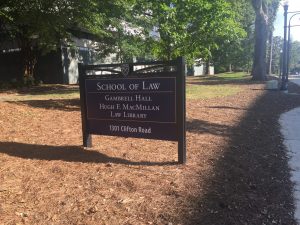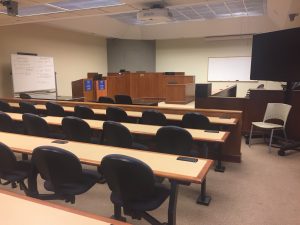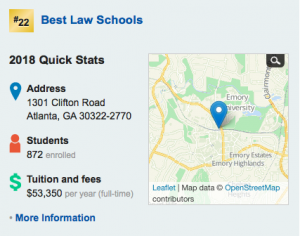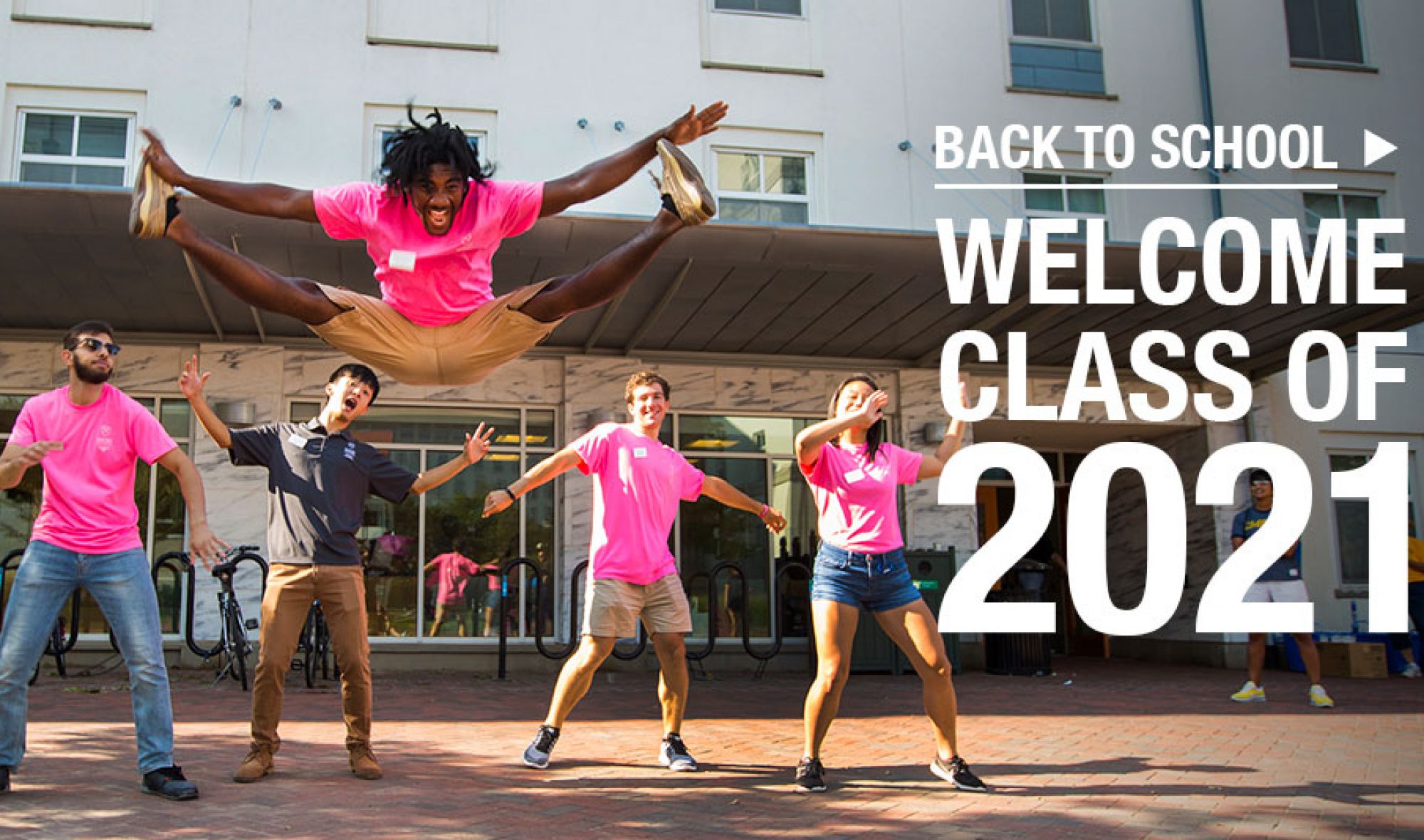In 1916, Emory University established a law school with a faculty of great teachers with degrees from the most highly regarded institutions of the era, a library of over 5,000 volumes, and a class of just twenty-seven students. Today, ranked number 22nd in the nation, the Emory University School of Law now has an annual enrollment of over 130 faculty members, 800 students and up to 301,490 volumes, a collection of written or printed sheets bound together as a book, at the library. Averaging a 90.7% bar pass rate, 97.6% graduate employment and an average score of 165 on the LSAT, the Emory University School of Law is regarded as one of the most prestigious law schools in the nation.

The Emory University School of Law has many programs for students to choose from such as: LLM, JD, JM, SJD and other joint degrees. One of the most prominent degrees is the Juris Master Dual degree program with Georgia Tech. With an annual tuition of $53,350, it is one of the best deals you get considering the ranking of the institution.
The Emory University School of Law offers a practical and disciplined approach to the study of law that engages students in the varied and integral roles the law plays in our community, society, and world. The student-centered focus, innovative programs, and commitment to scholarships prepare graduates to make an immediate and lasting impact. The Emory School of Law provides students a wide variety of opportunities through its many partnerships and programs as well, just to list a few:
The Law School’s Partnership with the Carter Center is an initiative promoting world peace founded by former President Jimmy Carter. The Carter Center provides Emory with exceptional opportunities to understand and engage global challenges such as strengthening rule of law in Liberia, establishing foundations for long-term peace in the Sudans, and fighting diseases like Malaria and Guinea Worm Disease. Emory faculty and graduate students, with the help of the Carter Center programs, have the opportunity to help understand and solve complex problems such as the persistence of gender-based violence in post-conflict societies, the role of elections in transitional contexts, and the gap between theory and practice in disease elimination and eradication. The partnership opportunities are accessible to any and all graduate students of the Law school.
Additionally, graduate students can take part in the the Law School’s own Center for Transactional Law and Practice program. According to Emory University school of Law’s website “Through the Center’s Transactional Law Program, students have the opportunity to acquire a strong foundation in business law doctrine, become financially literate, and practice contract drafting and other critical deal skills”. The program provides a roadmap for every student interested in studying transactional law. Whether through in-class simulations of deals or transactional law externships with actual clients, students in the Transactional Law Program get the chance to experience what being a deal lawyer is really like. This program is accessible to virtually all Emory law school students.

Within this listing, it would be a shame not to mention Emory Law school’s Moot Court Society. The Moot Court Society is a competitive, student-run organization that, according to Emory University school of Law, provides “experiential opportunities to develop oral advocacy and brief-writing skills.” Emory Law students organize and host the annual Civil Rights and LibertiesMoot Court Competition, held at Emory Law in the Fall semester. This year’s competition will be held on October 20-22, 2017. Five professors and professionals will be reviewing the briefs. This program is accessible to all JM degree seekers.
Last but not least, is Emory Law school run Emory Law Mock Court. Graduate students undergo a selective process where they get involved with presenting and debating prosecution and defensive sides for real world cases in a Law school run Mock court. Emory College undergraduate students also have the opportunity to aid graduate students involved in the program as assistant or “secondary lawyers.”
I interviewed Cale, a prospective student, to hopefully hear a different perspective on how he views the School of Law. I thought it would be interesting to see what makes a student want to apply to the Emory School of Law, how an outsider who wants to be an insider views the institution, and what advice he can give that he has learned his process. Ultimately, I wanted to collect evidence to help guide students at Emory on whether they should attend the Emory School of Law.
In preparation for our interview, I emailed Cale questions that I was going to ask him previous to our meeting so that he would be prepared and well versed. We talked about the Law School in a study lounge in the Woodruff Library. Below is the transcript from our dialogue.
Hunter: Hi Cale. You are considering applying to Emory School of Law, correct?
Cale: Yes, I am thinking of applying.
Hunter: What would you hope to get out of the Law School?
Cale: I wish to get an education on how to practice law. Hopefully a strong foundation in law will help me enact my own moral compass. Not to sound like I am a personal savior, but I hope that law school will provide me an apparatus to right the wrong. Also, I think being a lawyer would be a practical and tangible job for me.
Hunter: What makes you want to apply to Emory School of Law, and what makes you not want to apply?
Cale: Emory School of Law is a highly revered institution. It is ranked by U.S. News as the 22nd best law school in the nation, but it only matters if you give heed to their rankings, like if they actually mean anything. What they do mean, no one can really articulate. I would go for the connections. Emory School of Law has an incredibly noteworthy alumni base.

Honestly, I would have a tough time committing to Emory School of Law as an undergraduate student. After the undergraduate experience, I don’t think I can do Emory again. From what I have heard, there is little difference between the undergraduate experience at Emory and the graduate experience. I want something different. I think that’s how most kids would put it. It’s not social enough, Emory School of Law is a very solitary experience. Students compete with grades; it is very cutthroat.
Hunter: What could Emory’s law school do to give its students a better experience and consequently make it more attractive to prospective students?
Cale: I think they should do more to reach out to the undergraduate students who are not pre-law. I am a philosophy major, a major in which students often continue to law school. I am yet to receive contact from Emory School of Law. As an Emory student who is considering the Law School here, I think they need to do better marketing. Maybe a business degree would have benefited the Law School professors and Law School management.
Hunter: What advice do you have for other students applying to the law school?
Cale: My biggest piece of advice is study the LSAT for at least 200 hours. Take your time. The LSAT score is clearly the most important part of the application to do well. Effective articulation in arguments and correct comprehension of readings is crucial. It is a very technical test. Internships also help. An attractive résumé is always beneficial.
Hunter: Thank you! I wish you the best of luck in the application process.
Cale: Thank you for your wishes. Best of luck to you too. It was a pleasure meeting you.
Here are my conclusions and my advice:
Cale and likely the majority of other prospective students at Emory see Emory School of Law as a potential graduate school of their liking predominately because of its high ranking and how highly revered it is. Students may be shied away from the school’s perceived solitary experience where the environment is highly competitive. Perhaps if Emory did a better job of its, for lack of a better phrase, public relations, they may find a way to change how the school is perceived.
Furthermore, I concluded something about the undergraduate experience in relation to the graduate experience here at Emory and likely at other schools. If you are an undergraduate student at school X, you probably don’t want to be a graduate student at School X. Expand your world. The two experiences are likely too similar.
My advice to Emory students on the pre-law track, if you can get into Emory School of Law, you will likely get into many other law schools of which many will be better suited for you. You should be willing to expand your horizons and be open to applying to different law schools. Moreover, you should not simply attend a school because of its ranking. Apply for more compelling reasons. Also, regardless of your major, be open to considering law because of the many doors it may open in the future. Study the LSAT tirelessly; it is arguably the most important aspect of your application.
By Sandro, Josh, and Hunter
Ranchod-Nilsson, Sita. “The Carter Center.” Emory University main site, www.emory.edu/ACAD_EXCHANGE/issues/2013/autumn%20/stories/ranchod-nilsson/index.html. Accessed 24 Sept. 2017.
“Emory Law | Emory University School of Law | Atlanta, GA.” Emory University School of Law, law.emory.edu/. Accessed 24 Sept. 2017.
“How Does Emory University School of Law Rank Among America’s Best Law Schools?” U.S. News & World Report, U.S. News & World Report, www.usnews.com/best-graduate-schools/top-law-schools/emory-university-03039. Accessed 24 Sept. 2017.
